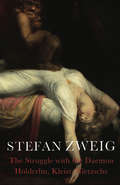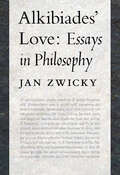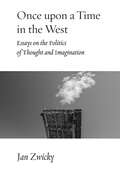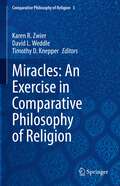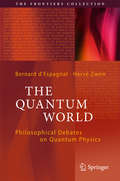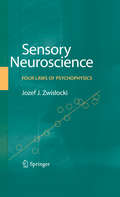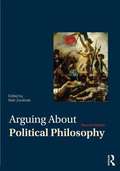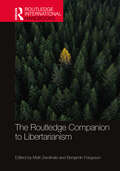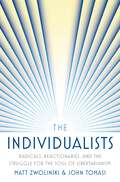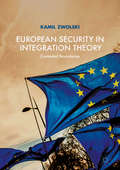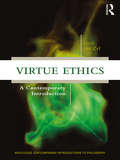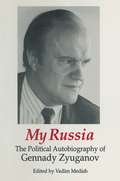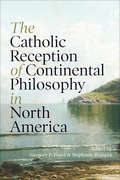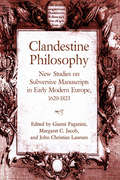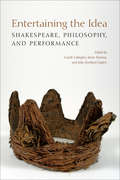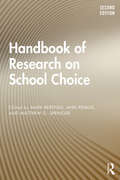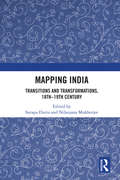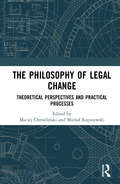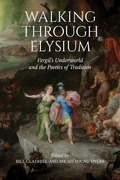- Table View
- List View
The Struggle with the Daemon
by Stefan Zweig Cedar Paul Eden PaulThe Struggle with the Daemon is a brilliant analysis of the European psyche by the great novelist and biographer Stefan Zweig. Zweig studies three giants of German literature and thought: Friedrich Ho¨lderlin, Heinrich von Kleist and Friedrich Nietzsche - powerful minds whose ideas were at odds with the scientific positivism of their age; troubled spirits whose intoxicating passions drove them mad but inspired them to great works. In their struggle with their inner creative force, Zweig reflects the conflict at the heart of the European soul - between science and art, reason and inspiration.Both highly personal and philosophically wide-ranging, this is one of the most fascinating of Zweig's renowned biographical studies.From the Trade Paperback edition.
Alkibiades' Love
by Jan ZwickyAlkibiades, a central character in Plato's Symposium, claims that philosophy touches him to the quick. When Socrates speaks, he's often moved to tears and realizes he must change his life. In Alkibiades' Love, Jan Zwicky demonstrates that this image of philosophy is not anachronistic, but remains the living heart of the discipline. Philosophy can indeed matter to our lives, but for it to do so, we must reconceive the methods that, since the Enlightenment, have dominated its self-image in the West. In these meticulously researched essays, Zwicky argues that analytic and poststructuralist philosophy are not simply fashions in academic discourse, but are manifestations of the technocracy which they sustain and promote. The alternative she develops, by showing it in action, is lyric philosophy - an integrated mode of understanding whose foundations lie in the way we comprehend music and metaphor. Written in lucid and powerful prose, Alkibiades' Love will interest a broad readership, from students of ancient Greek philosophy to ecologists seeking a coherent foundation for their work. Zwicky offers deep and original readings of Freud, Plato, and Simone Weil, and resuscitates Max Wertheimer's work, linking it to our comprehension of mathematics, metaphor, and ecological structures. Zwicky has been hailed as one of the most important and original thinkers of our time. Alkibiades' Love illuminates and extends her groundbreaking work while providing an accessible introduction for those coming to her thought for the first time.
Once upon a Time in the West: Essays on the Politics of Thought and Imagination
by Jan ZwickyWestern civilization is over. So begins Jan Zwicky’s trenchant exploration of the root of global cultural and ecological collapse: a way of thinking that is also linked to some of the West’s most noted achievements.The Renaissance merged imperial enterprise with Islamic algebra and recently recovered Greek mathematics to precipitate mechanized industry and resource extraction; these in turn made possible the growth of capitalism, the military-industrial complex, and Big Technology. Despite its self-image as objective, Zwicky argues, the West’s style of thought is not politically neutral, but intensely anthropocentric. It has led those who adopt it to regard the more-than-human world as nothing more than timber licences and drilling sites, where value is not recognized unless it is monetized. Oblivious to context and blind to big-picture thinking, it analyzes, mechanizes, digitizes, and systematizes, while rejecting empathy and compassion as distorting influences. Lyric comprehension, in Zwicky’s view, offers an alternative to this way of thinking, and she provides a wide range of examples. Once upon a Time in the West documents how a narrow epistemological style has left Western thought blind to critical features of reality, and how the terrifying consequences of that blinkered vision are now beginning to unfold.
This Great National Object: Essays in Philosophy
by Jan ZwickyMaking extensive use of the National Archives and the Archives of Ontario, Styran and Taylor unveil previously unpublished information about the construction of the canals, including technical plans and drawings from a wide variety of sources. They illustrate the technical and management intricacies of building a navigational trade and commerce lifeline while also revealing the vivid characters - from businessman William Hamilton Merritt to engineer John Page - who inspired the project and drove it to completion. The history of the Welland Canals is a gripping tale of epic proportions. Given the ongoing importance of the Great Lakes in the North American economy, interest in the St. Lawrence Seaway - of which the Welland is "the Great Swivel Link" - and the relevance of labour history, This Great National Object will be of interest to enthusiasts and historians alike.
Miracles: An Exercise in Comparative Philosophy of Religion (Comparative Philosophy of Religion #3)
by Karen R. Zwier David L. Weddle Timothy D. KnepperThis volume provides a comparative philosophical investigation into a particular concept from a variety of angles—in this case, the concept of “miracle.” The text covers deeply philosophical questions around the miracle, with a multiplicity of answers. Each chapter brings its own focus to this multifaceted effort. The volume rejects the primarily western focus that typically dominates philosophy of religion and is filled with particular examples of miracle narratives, community responses, and polemical scenarios across widely varying religious contexts and historical periods. Some of these examples defy religious categorization, and some papers challenge the applicability of the concept “miracle,” which is of western and monotheistic origin. By examining miracles thru a wide comparative context, this text presents a range of descriptive content and analysis, with attention to the audience, to the subjective experiences being communicated, and to the flavor of the narratives that come to surround miracles. This book appeals to students and researchers working in philosophy of religion and science, as well those in comparative religion. It represents, in written form, some of the perspectives and dialogue achieved in The Comparison Project’s 2017–2019 lecture series on miracles. The Comparison Project is an enterprise in comparing a variety of religious voices, allowing them to stand in dialogue.
The Quantum World
by Hervé Zwirn Bernard D'EspagnatIn this largely nontechnical book, eminent physicists and philosophers address the philosophical impact of recent advances in quantum physics. These are shown to shed new light on profound questions about realism, determinism, causality or locality. The participants contribute in the spirit of an open and honest discussion, reminiscent of the time when science and philosophy were inseparable. After the editors’ introduction, the next chapter reveals the strangeness of quantum mechanics and the subsequent discussions examine our notion of reality. The spotlight is then turned to the topic of decoherence. Bohm’s theory is critically examined in two chapters, and the relational interpretation of quantum mechanics is likewise described and discussed. The penultimate chapter presents a proposal for resolving the measurement problem, and finally the topic of loop quantum gravity is presented by one of its founding fathers, Carlo Rovelli. The original presentations and discussions on which this volume is based took place under the auspices of the French “Académie des Sciences Morales et Politiques”. The book will appeal to everybody interested in knowing how our description of the world is impacted by the results of the most powerful and successful theory that physicists have ever built.
Sensory Neuroscience: Four Laws of Psychophysics
by Jozef J. ZwislockiSensory Neuroscience: Four Laws of Psychophysics organizes part of psychophysics -- a science of quantitative relationships between human sensations and the stimuli that evoke them. Although psychophysics belongs to sensory neuroscience, and is coupled to neurophysiology, it has also branched out to various specialized disciplines, including the disciplines of vision and hearing, ophthalmology, optometry, otology, and audiology. Due to this diversification and fragmentation, psychophysics has had an ad-hoc, phenomenological orientation. Besides Weber's law of differential sensitivity, and the still-controversial Stevens' power law, it has lacked a systematic grid of scientific laws. Sensory Neuroscience: Four Laws of Psychophysics provides valid unifying principles and systematic applications for this otherwise fragmented precursor of experimental psychology, and defines four multisensory relationships of substantial generality between sensations and the underlying stimulus variables. This book will be particularly useful to auditory researchers, experimental psychologists, and behavioral neuroscientists.
Arguing About Political Philosophy (Second Edition)
by Matt ZwolinskiThis second edition of Arguing About Political Philosophy is the most complete, up-to-date, and interdisciplinary anthology of its kind. Its selections cover both classic philosophical sources such as Hobbes and Rousseau, and contemporary figures such as Robert Nozick and G. A. Cohen. But additional excerpts from economists, psychologists, novelists, and legal theorists help students from diverse intellectual backgrounds to connect with and appreciate the problems and distinctive methodology of political philosophy. This second edition also goes beyond any other anthology on the market in its coverage of traditionally under-represented views such as libertarianism, neo-socialism, feminism, and critical race theory. And it is one of the only anthologies to go beyond A Theory of Justice in its coverage of the political thought of John Rawls. The volume is divided into 3 parts - Foundational Concepts; Government, the Economy and Morality; and Applied Political Philosophy - covering core arguments and emerging debates in topics like: social contract theory political economy property rights freedom equality immigration global distributive justice The new companion website offers valuable resources for instructors and students alike, including sample quizzes, exams, and writing assignments, extensive study questions for each reading, and an online version of the "What's Your Political Philosophy" self-assessment.
The Routledge Companion to Libertarianism (Routledge International Handbooks)
by Matt ZwolinskiHave you ever wondered what libertarians think about vaccine mandates? About gun control? About racial and sexual inequalities? While libertarianism is well known as a political theory relating to the scope and justification of state authority, the breadth and depth of libertarian work on a wide range of other topics in social and political philosophy is less well known. This handbook is the first definitive reference on libertarianism that offers an in-depth survey of the central ideas from across philosophy, politics, and economics, including applications to contemporary policy issues. The forty chapters in this work provide an encyclopedic overview of libertarian scholarship, from foundational debates about natural rights theories vs. utilitarian approaches, to policy debates over immigration, punishment and policing, and intellectual property. Each chapter presents a comprehensive and up-to-date overview of historical and contemporary libertarian thought on its subject, and thus serves as an essential guide to current scholarship, and a starting place for discovering future lines of research. The book also contains a section on criticisms of libertarianism, written by leading scholars from the feminist, republican, socialist, and conservative perspectives, as well as a section on how libertarian political theory relates to various schools of economic thought, such as the Chicago, Austrian, Bloomington, and Public Choice schools. This book is an essential and comprehensive guide for anyone interested in libertarianism, whether sympathizer or critic.
The Individualists: Radicals, Reactionaries, and the Struggle for the Soul of Libertarianism
by Matt Zwolinski John TomasiA sweeping history of libertarian thought, from radical anarchists to conservative defenders of the status quoLibertarianism emerged in the mid-nineteenth century with an unwavering commitment to progressive causes, from women’s rights and the fight against slavery to anti-colonialism and Irish emancipation. Today, this movement founded on the principle of individual liberty finds itself divided by both progressive and reactionary elements vying to claim it as their own. The Individualists is the untold story of a political doctrine continually reshaped by fierce internal tensions, bold and eccentric personalities, and shifting political circumstances.Matt Zwolinski and John Tomasi trace the history of libertarianism from its origins as a radical progressive ideology in the 1850s to its crisis of identity today. They examine the doctrine’s evolution through six defining themes: private property, skepticism of authority, free markets, individualism, spontaneous order, and individual liberty. They show how the movement took a turn toward conservativism during the Cold War, when the dangers of communism at home and abroad came to dominate libertarian thinking. Zwolinski and Tomasi reveal a history that is wider, more diverse, and more contentious than many of us realize.A groundbreaking work of scholarship, The Individualists uncovers the neglected roots of a movement that has championed the poor and marginalized since its founding, but whose talk of equal liberty has often been bent to serve the interests of the rich and powerful.
European Security in Integration Theory: Contested Boundaries
by Kamil ZwolskiThis book examines federalism and functionalism – two fundamental, yet largely forgotten, theories of international integration. Following the recent outbreak of the war in Ukraine, policy practitioners and scholars have been in search of a deeper understanding of the likely causes of the conflict and its consequences for the European security architecture. Various theories have been deployed to this end, but international and European integration theory remains conspicuously absent. The author shows how the core tenets of integration theories developed after World War I, particularly how they viewed territoriality and geopolitical boundaries, remain as relevant today as they were almost 100 years ago.
Virtue Ethics: A Contemporary Introduction (Routledge Contemporary Introductions to Philosophy)
by Liezl Van ZylThis volume provides a clear and accessible overview of central concepts, positions, and arguments in virtue ethics today. While it focuses primarily on Aristotelian virtue ethics, it also includes discussion of alternative forms of virtue ethics (sentimentalism and pluralism) and competing normative theories (consequentialism and deontology). The first six chapters are organized around central questions in normative ethics that are of particular concern to virtue ethicists and their critics: What is virtue ethics? What makes a trait a virtue? Is there a link between virtue and happiness? What is involved in being well-motivated? What is practical wisdom? What makes an action right? The last four chapters focus on important challenges or objections to virtue ethics: Can virtue ethics be applied to particular moral problems? Does virtue ethics ultimately rely on moral principles? Can it withstand the situationist critique? What are the prospects for an environmental virtue ethics? ?
My Russia: The Political Autobiography of Gennady Zyuganov
by Gennady Zyuganov Vadim MedishGennady Andreevich Zyuganov is the leader of Russia's resurgent Communist Party and was Boris Yeltsin's strongest challenger in the summer 1996 presidential elections. Although his face became familiar to the world at that time, his ideas and his programme were mainly a subject of speculation. A former village teacher from Orel Province, Zyuganov came to Moscow in the 1980s to work in the ideology department of the Communist Party of the Soviet Union and to complete doctoral work in philosophy at Moscow State University. He is a prolific writer who has rebuilt the Communist Party on his vision of a Russian socialist great power. Today he leads the Communist faction in the Duma and is chairman of the united opposition movement - the National Patriotic Union. This volume is a compilation of Zyuganov's writings on Russia's past and present and her place in the world; Russia's fate under the new leadership of Gorbachev and Yeltsin; his own vision of Russia's future under a new Communist leadership; and his reflections on the 1996 presidential election of the Communist Party of the Russian Federation.
The Catholic Reception of Continental Philosophy in North America
This volume by leading philosophers and theologians explores the reception of continental philosophy in North America and its ongoing relation to Catholic institutions. What has prompted so many North American Catholics to support this particular school of thought? Why do so many Catholics continue to find continental philosophy attractive, and why do so many continental philosophers work in Catholic departments? The establishment of the relationship between continental philosophy and Catholicism was not obvious, nor was it easy. Many of the contributors to this volume have played important roles in its development, and in these pages they take a stance on this evolving relationship and demonstrate that the engagement is far from over. Exploring the mutual interests that made this alliance possible as well as the underlying tensions, the volume provides, for the first time, an extended reflection on the historical, institutional, and intellectual relationship between Catholicism and continental philosophy on North American soil up to the present day.
Clandestine Philosophy: New Studies on Subversive Manuscripts in Early Modern Europe, 1620–1823 (UCLA Clark Memorial Library Series)
Clandestine philosophical manuscripts, made up of forbidden works including erotic texts, political pamphlets, satires of court life, forbidden religious texts, and books about the occult, had an avid readership in the seventeenth and eighteenth centuries, becoming objects of historical research by the twentieth century. The purveyors of the clandestine could be found in the Dutch Republic, Switzerland, Denmark, Spain, and not least in Paris or London. Despite the heavy risks, including prison, the circulation of these manuscripts was a prosperous venture. After Ira Wade’s pioneering contribution (1938), Clandestine Philosophy is the first work in English entirely focused on the philosophical clandestine manuscripts that preceded and accompanied the birth of the Enlightenment. Topics from philosophy, political and religious thought, and moral and sexual behaviour are addressed by contemporary authors working in both America and Europe. These manuscripts shed light on the birth of pornography and provide an important avenue for investigating philosophical, religious, political, and social critique.
Entertaining the Idea: Shakespeare, Performance, and Philosophy (UCLA Clark Memorial Library Series)
To entertain an idea is to take it in, pay attention to it, give it breathing room, dwell with it for a time. The practice of entertaining ideas suggests rumination and meditation, inviting us to think of philosophy as a form of hospitality and a kind of mental theatre. In this collection, organized around key words shared by philosophy and performance, the editors suggest that Shakespeare’s plays supply readers, listeners, viewers, and performers with equipment for living. In plays ranging from A Midsummer Night’s Dream to King Lear and The Winter’s Tale, Shakespeare invites readers and audiences to be more responsive to the texture and meaning of daily encounters, whether in the intimacies of love, the demands of social and political life, or moments of ethical decision. Entertaining the Idea features established and emerging scholars, addressing key words such as role play, acknowledgment, judgment, and entertainment as well as curse and care. The volume also includes longer essays on Shakespeare, Kant, Husserl, and Hegel as well as an afterword by theatre critic Charles McNulty on the philosophy and performance history of King Lear.
Handbook of Research on School Choice
Updated to reflect the latest developments and increasing scope of school-based options, the second edition of the Handbook of Research on School Choice makes readily available the most rigorous and policy-relevant research on K–12 school choice. This comprehensive research handbook begins with scholarly overviews that explore historical, political, economic, legal, methodological, and international perspectives on school choice. In the following sections, experts examine the research and current state of common forms of school choice: charter schools, school vouchers, and magnet schools. The concluding section brings together perspectives on other key topics such as accountability, tax credit scholarships, parent decision-making, and marginalized students. With empirical perspectives on all aspects of this evolving sphere of education, this is a critical resource for researchers, faculty, and students interested in education policy, the politics of education, and educational leadership.
Mapping India: Transitions and Transformations, 18th–19th Century
This book presents an alternate history of colonial India in the 18th and the 19th centuries. It traces the transitions and transformations during this period through art, literature, music, theatre, satire, textiles, regime changes, personal histories and migration. The essays in the volume examine historical events and movements which questioned the traditional parameters of identity and forged a new direction for the people and the nation. Viewing the age through diverse disciplinary angles, the book also reflects on the various reimaginings of India at the time. This volume will be of interest to academics and researchers of modern Indian history, cultural studies and literature. It will also appeal to scholars interested in the anthropological, sociological and psychological contexts of imperialism.
The Philosophy of Legal Change: Theoretical Perspectives and Practical Processes
Democratic legal systems have recently been subject to rapid and multi-directional processes of change. There are numerous sociological, technological, ideological, or purely political processes which result in law’s amendment and transformation. This book argues that this legal change is best understood from a political philosophy perspective. This can be used as an interpretative device to understand the ongoing processes of change as well as their outcomes such as new laws, judicial interpretations, or constitutional amendments. The work has three main objectives: to provide deeper understanding of the problems of legal change within the diversity of Western political and legal thought; to examine the development of the processes of change in terms of their normative and prudential acceptability; to interpret actual processes of change with a view to the general theoretical and normative background. The book is divided into three parts: Part I sets the scene and is focused on the general issues important for understanding and evaluating legal change from the perspective of political philosophy; Part II focuses on the spectrum of politico-philosophical justifications present in the political culture of democratic states; Part III offers selected case studies to specify and apply the philosophical ideas in the previous parts. The book will be a valuable resource for students and scholars of law and jurisprudence, including comparative legal studies and human rights law, political theory, and philosophy.
Walking through Elysium: Vergil’s Underworld and the Poetics of Tradition (Phoenix Supplementary Volumes)
Walking through Elysium stresses the subtle and intricate ways writers across time and space wove Vergil’s underworld in Aeneid 6 into their works. These allusions operate on many levels, from the literary and political to the religious and spiritual. Aeneid 6 reshaped prior philosophical, religious, and poetic traditions of underworld descents, while offering a universalizing account of the spiritual that could accommodate prior as well as emerging religious and philosophical systems. Vergil’s underworld became an archetype, a model flexible enough to be employed across genres, and periods, and among differing cultural and religious contexts. The essays in this volume speak to Vergil’s incorporation of and influence on literary representations of underworlds, souls, afterlives, prophecies, journeys, and spaces, from sacred and profane to wild and civilized, tracing the impact of Vergil’s underworld on authors such as Ovid, Seneca, Statius, Augustine, and Shelley, from Pagan and Christian traditions through Romantic and Spiritualist readings. Walking through Elysium asserts the deep and lasting influence of Vergil’s underworld from the moment of its publication to the present day.
